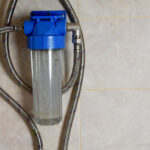If your home has hard water, you might want to consider installing a water softener. Homeowners utilize a large amount of water for multiple tasks, such as bathing, cleaning, cooking, and maintaining the lawn.
But hard water can lead to health problems, especially skin irritation. It can also cause home maintenance problems, such as clogged pipes and mineral deposit buildup that can affect the lifespan of appliances.
A water softener can mitigate some of those problems. If you’re thinking about installing a water softening system, here’s what to know.
Benefits of installing a water softening system
Reduced mineral buildup
The biggest problem with hard water is that it contains calcium and magnesium ions that create mineral scale buildup. Water softeners remove minerals that cause limescale, making cleaning with water much more efficient. With a water softening system, you’ll save money on cleaning products and reduce the amount of time you spend cleaning. Plus, soft water doesn’t leave a streaky residue.
Longer lifespans for appliances
Hard water has a tendency to cause mineral deposits in pipes, faucets, and appliances, which may cause them to malfunction or wear out or stop working much faster. By installing a water softener, you can help ensure your appliances work more efficiently and last longer.
Health benefits
Many people struggle with skin problems when they have hard water. Taking a bath or shower in hard water can cause dry skin or irritation. Hard water can also cause hair to become dry and brittle. Soft water can help both skin and hair feel more nourished and moisturized.
Resale value
If you’re selling your house and have hard water, consider upgrading to a water softening system. If you live in an area with hard water, mentioning this upgrade in your home listing could attract buyers who want to purchase a home with an already upgraded water system.
Drawbacks of installing a water softening system
Cost
Installing a water softening system in your home can be expensive, ranging from a few hundred dollars to a few thousand dollars. The cost varies depending on the size of the system and whether you hire a company to install it for you.
Maintenance
Installing a water softening system is not as straightforward as setting it up and forgetting about it. Water softeners require regular maintenance if they are salt based. You’ll need to check for leaks, clean the tank, and add salt if your system requires it.
Steps to take before buying a water softening system
Complete a hard water test
Purchase a test kit to find out the hardness level of your water. This can help you determine the type and size of the water softening system you’ll need. Knowing the size of the system you need will also help you understand how much it will cost to install and maintain it.
Determine the best type of system
There are several different types of water softening systems. Most come with or without salt. If you have a salt-based system, which is also called an ion exchange system, you will have to perform regular maintenance for it to continue working effectively. Saltless water softeners don’t require salt refills, but they also don’t remove hard minerals from your water. Rather, they change the minerals’ chemical makeup so they don’t cause buildup.
Decide whether to DIY or hire a professional
Depending on the size of your system, you may be able to install a water softening system yourself. However, if you’re installing a large system that involves plumbing work, you may need to hire a professional. The professional might have to secure a permit before beginning work. It’s best to check with your local government to see if a permit is required, and be prepared for an additional cost.
Final thoughts
Although it may be expensive to purchase, install, and maintain a water softening system, the benefits may outweigh the drawbacks. Not only can soft water help improve the longevity of expensive appliances — saving you money down the road — it can also help you have healthier skin and hair.
Should you decide to sell your home in the future, buyers, investors, and companies that buy houses for cash will likely appreciate a home that has a water softening system already installed. For those reasons, a soft water system is an investment in your home worth considering.
5 Signs You Need a Water Softener Repair


